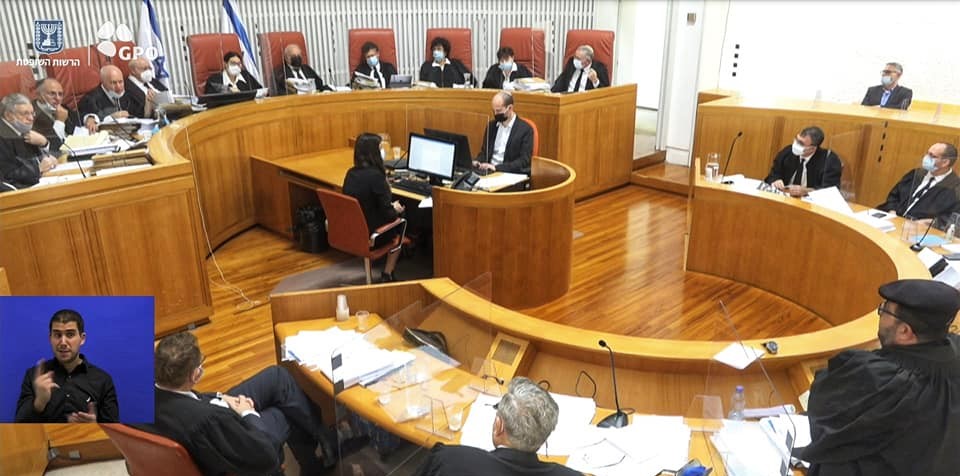Adalah — The Legal Center for Arab Minority Rights in Israel — published a report last week entitled The Israeli Supreme Court and the COVID-19 Emergency. The report comprehensively analyzes decisions made by the Court during the first wave of the pandemic crisis (January to August 2020) regarding 88 coronavirus-related petitions brought before it in its capacity as the High Court of Justice (HCJ), i.e., adjudicating matters of justice which do not fall under the purview of any other court.
According to Zo Haderech, “The report shows an overall unwillingness by the HCJ to intervene to protect human rights and prohibit governmental rule-making undertaken without parliamentary (Knesset) oversight.” The Court rejected or dismissed almost all of the 88 petitions filed before it, used a variety of avoidance strategies, only very rarely issued an order nisi (show cause order), and ruled in favor of only a single temporary injunction.

Adalah General Director Atty. Hassan Jabareen (wearing a cap in the lower right corner of the photograph) during a session of the Supreme Court in Jerusalem (Footage: GPO)
Adalah’s report provides essential background and analysis for lawyers, jurists and decision-makers working globally. It is particularly pertinent for those interested in COVID-19, human rights, rule of law and the balance of power between the executive, legislature and judiciary branches during a public health emergency. The report’s release now is especially timely given the current resurgence of the virus and possible re-institution by far-right governments of myriad restrictions on our daily lives and freedoms.
The report describes how, from the outset of the coronavirus outbreak, and in response to perceived dangers that it posed, the former Netanyahu government decreed, and justified with relative ease, emergency regulations and exceptional measures touching on all aspects of life. In issuing 39 emergency regulations, many of which resulted in serious violations of human rights, especially for Palestinians, the government relied on the preexisting, security-based “state of emergency” which has remained in place since 1948.
The current Adalah report analyses the different and newly, emergent legal questions brought before the Supreme Court, and how it has dealt with these issues. It also examines the extent of the Court’s intervention in response to petitioners who sought relief from the Court in challenges to the government’s issuance of emergency regulations during the first wave of the COVID-19 outbreak in Israel. While the report explores the Court’s decision-making during a health emergency, it also shows its failure to protect human rights. In the period between January and August 2020, Arab-Palestinian citizens of Israel, Palestinians in the occupied Palestinian territories, and other vulnerable groups, submitted numerous petitions to the Court in response to heightened violations of their human rights, including in the realms of health, education, employment and economic rights, and more.
Adalah stands among the leading human rights organizations in Israel that have challenged the far-right government’s exercise of sweeping powers, including with respect to the government’s issuance of COVID-19 emergency regulations.


